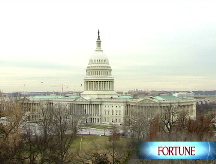Oil falls after touching $50 a barrel
Crude retreats as concerns about the economy beat out talk of a possible OPEC production cut.
NEW YORK (CNNMoney.com) -- Oil prices retreated after briefly topping $50 a barrel Monday as concerns about the economy overshadowed a possible production cut from the Organization of Petroleum Exporting Countries.
U.S. crude for January delivery fell $1.77 to settle at $44.51 a barrel. It touched a high of $50.05 earlier in the session.
The January contract expires at the end of this week.
"This is just a tug-of-war between OPEC bulls and economic bears," said Jim Williams, energy economist with WTRG Economics in Arkansas.
Reports indicate that ministers from OPEC, a trade organization that produces about 40% of the world's oil, will call for a production cut at its meeting in Algeria on Wednesday.
"They must cut production to maintain the price," said Williams.
OPEC nations have expressed concern about oil prices, which have fallen rapidly since hitting a record high of $147.27 a barrel in mid-July. The group pledged in late October to cut production by 1.5 million barrels a day in order to bolster prices, but the cut had little effect on the market at that time.
After prices dipped below $45 a barrel earlier this month, OPEC President Chakib Khelil said in an Associated Press interview that the market would see another "severe" cut in production at its meeting on Dec. 17 in Algeria.
"If their goal is to stem the price (decline) 1.5 million to 2 million (barrels a day) will do it," said Williams. However, if they want to get the price back up to about $70 a barrel, the cartel needs to cut "3 million at least by the end of February, early spring."
OPEC Secretary General Abdalla Salem El-Badri said at the beginning of the month that the ideal price for crude was between $70 a barrel to $90 a barrel, according to Dow Jones.
However, OPEC has a tough road to travel if it wants to overcome the dour economy, according to Phil Flynn, senior market analyst with Alaron Trading in Chicago.
"Even if they cut production, if the economy is weak, who's going to buy their oil?" asked Flynn. Raising prices is not going to spur demand, he added.
Economy: U.S. industrial production declined in November, the Federal Reserve said Monday.
And the White House said Friday it may use part of the $700 billion allocated for banking sector bailouts to keep automakers General Motors (GM, Fortune 500) and Chrysler from collapsing.
A plan to provide $14 billion in loans to the automakers to keep them from going bankrupt before March failed in the Senate last week.
"If they don't bail them out [the recession] will get much worse," said Williams, pointing out the increasing number of jobs that have been lost in the U.S. already.
Last week, the Labor Department said that the number of Americans applying for state unemployment benefits rose to a 26-year high.
The U.S. auto industry employs about 2 million workers, according to the Center for Automotive Research. That total includes GM, Ford and Chrysler workers, as well as dealers and workers at parts manufacturers.
As the economy slows, consumers and businesses have cut back on the consumption of petroleum-based fuels.
Americans drove 100 billion fewer miles during the 12-month period between November 2007 and October 2008 compared with the prior year, according to the Transportation Department.
"The weaker the (U.S.) economy gets, generally the weaker the world economy gets, and the weaker the world economy gets, the lower oil prices go," said Williams.
Dollar: Oil prices gained some measure of support as the dollar weakened against the 15-nation euro and the British pound.
Since oil, like other commodities, is priced in dollars, a decline in the U.S. currency makes oil cheaper for foreign investors, which spurs buying.
"The strength in commodities is the follow-through in dollar weakness," said Brian Dolan chief currency strategist with online brokerage Forex.com.
The dollar has declined in value as an easing credit crunch has caused investors to unwind some of their dollar hedges, and a deepening recession continues to weigh on the U.S. economy, according to Dolan.
Plus, the existing relationship between the two types of investments is being amplified because one of the mathematical models used in trading software is triggering dollar-oil trading orders, he added. ![]()




